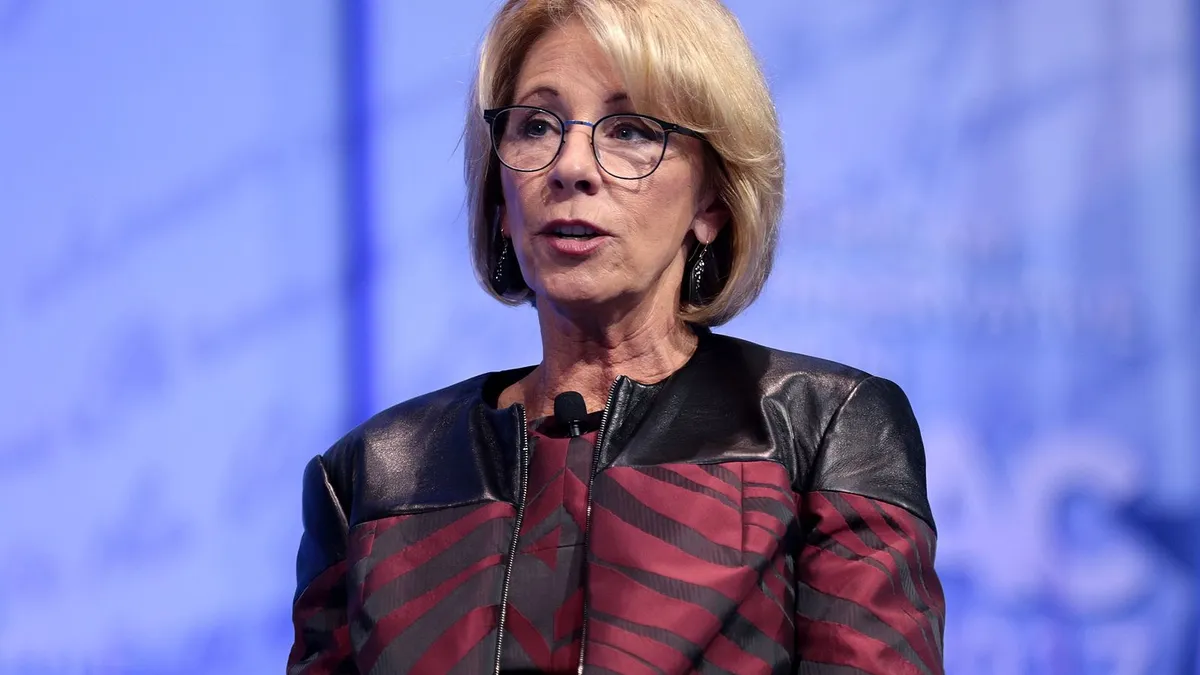Dive Brief:
- The U.S. Department of Education last week released a proposed rule that makes it clear that colleges risk losing federal aid if they discriminate against religious student groups.
- In the draft regulation, the department emphasized that faith-based institutions are equally eligible for the same federal grants as non-religious colleges and universities.
- Education Secretary Betsy DeVos lauded the rule as a significant new step in protecting the First Amendment and religious liberties. But experts say the rule isn't particularly groundbreaking and that faith-affiliated entities aren't under threat.
Dive Insight:
In developing the new rule, the Education Department cited a 2017 Supreme Court ruling, Trinity Lutheran v. Comer, which found the government can't deny religious organizations federal funding that they are eligible for simply because of their non-secular status.
The proposed regulations, which were published in the Federal Register for public comment last week, mean to ensure institutions are "on equal terms" for obtaining and using federal grant money. The Education Department stressed in the regulations that religious colleges and universities could apply for its federal aid without worrying about potential prejudice. Faith groups would also no longer be required to have different "assurances or notices" for their services, when secular organizations would not.
This is likely a reference to an Obama-era executive order that forces faith-based organizations to refer anyone who uses their services, and objects to their religious status, to another, secular provider. The rules would remove those mandates.
Under the proposal, public colleges and universities would need to comply with the First Amendment to continue receiving grant funding. Private colleges, meanwhile, would need to meet their own internal policies on free speech.
To determine if there was a free-expression violation, the department would look to whether a state or federal court issued a "final, non-default judgment" against an institution.
Institutions also potentially imperil their access to federal grants if they refuse rights or benefits to religious student groups that are afforded to their secular counterparts. This reflects another White House foray into free expression in higher ed.
President Donald Trump signed an executive order in March that demanded 12 federal agencies ensure postsecondary institutions were complying with the First Amendment or free speech policies, depending on if they are public or private, respectively.
Ted Mitchell, president of the American Council on Education, said in a statement at the time that it was unclear how the order would be implemented. Many pundits opined that the administration's step was unnecessary and redundant, because religious groups can already seek legal remedies if their civil rights are infringed.
The draft regulations for religious institutions are similarly "useless," Michael Olivas, an expert in higher ed law and a retired professor at the University of Houston, said in an interview with Education Dive.
Olivas, who has written at length about religion in higher ed, said such institutions "are wrong in claiming victimhood." Court cases and existing law have already carved out exceptions for religious groups, he said. Faith-based colleges, for instance, can seek religious exemptions from Title IX, the federal law barring sex discrimination on campuses. The new rules would also offer colleges new ways to demonstrate their eligibility for a Title IX exemption.
Even the Foundation for Individual Rights in Education (FIRE), a civil rights watchdog group in academe that usually praises any change that facilitates free speech on campus, noted that colleges having to meet constitutional obligations as a part of the regulations was "uncontroversial."
FIRE also wrote that Trump's March executive order could be particularly damaging for colleges because losing a free speech court battle could lead to their federal research funding being devastated. The proposed rule "reduces, but does not eliminate these concerns" by instead imposing a range of potential sanctions and only a loss of grant programs.
The White House's move to advance religious institutions and protections is "very much in line" with the president's priorities, Peter Lake, director of the Center for Excellence in Higher Education Law and Policy at Stetson University, told Education Dive.
Evangelical voters helped carry Trump to the presidency, and he has courted them as election season approaches. Jerry Falwell Jr., the controversial president of Liberty University and a major figure for evangelicals nationwide, for instance, has been a particularly vociferous Trump supporter.
The public can submit comments on the proposed regulations through Feb. 18.














